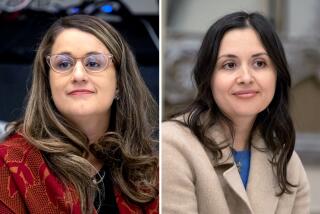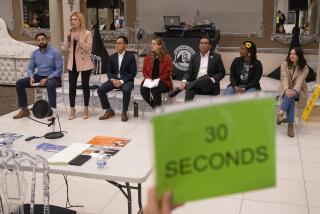Newton: Off and running in the L.A. mayor’s race
A new poll on the Los Angeles mayor’s race confirms the conventional wisdom: Most voters have yet to make up their minds, but among those who have decided, City Councilman Eric Garcetti and Controller Wendy Greuel remain locked in a close match with a hefty lead over their nearest rivals.
But the survey also offers some intriguing insights into the advantages and vulnerabilities of the leading candidates, as well as hints about the way the campaign may play out.
The poll, conducted by the Center for the Study of Los Angeles at Loyola Marymount University, surveyed 4,411 voters on election day as they emerged from voting booths across the city. The survey found that if the voters who have made up their minds were casting ballots in the mayor’s race today, a plurality — 36.1% — would opt for Garcetti, nudging out Greuel, who received the support of 32.3%.
Still, with roughly two-thirds of those interviewed acknowledging that they have yet to make up their minds, and with four months to go before the first round of the elections, that’s a very close race — understandable, given that Garcetti and Greuel are both affable, intelligent Democrats with moderate to liberal records and not many obvious points of disagreement.
“The race is wide open,” said Fernando Guerra, director of the center, which will release full results of the poll today. “These are two candidates who are very similar … their personalities, how they appear to voters.”
The results reveal a big gap between the two front-runners and others in the race. Councilwoman Jan Perry was the favorite of only 15.1% of those expressing an opinion. Lawyer and radio personality Kevin James drew just 8.7%. In James’ case, however, the survey does suggest that he is making modest progress, and the recent announcement that a prominent conservative fundraiser is poised to spend heavily for him — James is the only Republican in the race — gives him a possible path forward.
Garcetti’s lead at this early stage is certainly not commanding, but buried in the demographic analyses are some numbers that make his edge seem stronger than the overall result. His support is surprisingly broad-based, an asset in multicultural Los Angeles. According to the survey, he holds a big lead among Latinos — Garcetti comes from a Mexican American family — and an even bigger one among Asians. He and Greuel were virtually tied among African Americans (51% of whom favored Perry, the only African American in the race), and Greuel was ahead by 5 points among whites. Garcetti also was favored by voters of every level of education, by union members and by Democrats. In Los Angeles, that’s the makings of a winning coalition.
But the poll contains yet another wrinkle. Although Garcetti was favored by a slim margin in the larger field, the advantage shifted in the event of a hypothetical runoff between him and Greuel. There, Greuel was favored by 50.6% to Garcetti’s 49.4%, a lead that falls within the survey’s 2.89% margin of error.
What accounted for the bump in Greuel’s favor? Once voters were denied the chance to favor Perry, some women and blacks jumped to Greuel’s camp. James’ more conservative backers also gravitated to Greuel, who does better among Republicans than Garcetti. In such a close race, those small shifts matter.
Polls are sensitive instruments, and open to misinterpretation. The recent presidential campaign, for instance, featured an avalanche of poll-watchers on the right who argued for months that polling had overstated President Obama’s chances of being reelected because the surveys over-predicted the influence of black and young voters. Those harangues proved to be false, though they seem to have misled Mitt Romney into believing he might prevail.
In this case, the risk is not real or imagined ideological bias — the Loyola survey is steadfastly nonpartisan and not connected to any candidate — but rather one of timing. The presidential election consumes so much voter and media attention that it’s hard for any mayoral candidate to make an impression until the presidency is decided. Because this survey was conducted on election day, it’s best thought of as a preliminary look at the mayor’s race, not a predictive one.
Still, it suggests where the campaign may be headed. Garcetti and Greuel need to distinguish themselves from each other in the minds of voters or risk dividing their natural support. Perry needs to convince potential donors and voters that she’s a credible candidate and not just a spoiler. James needs to hope that a pile of conservative money elevates his profile without alienating the city’s decidedly Democratic majority.
Winning won’t be easy for any of them, but it’s not impossible for any of them either. And the race begins now.
Jim Newton’s column appears Mondays. His latest book is “Eisenhower: The White House Years.” Reach him at jim.newton@latimes.com or follow him on Twitter: @newton_jim.
More to Read
A cure for the common opinion
Get thought-provoking perspectives with our weekly newsletter.
You may occasionally receive promotional content from the Los Angeles Times.






